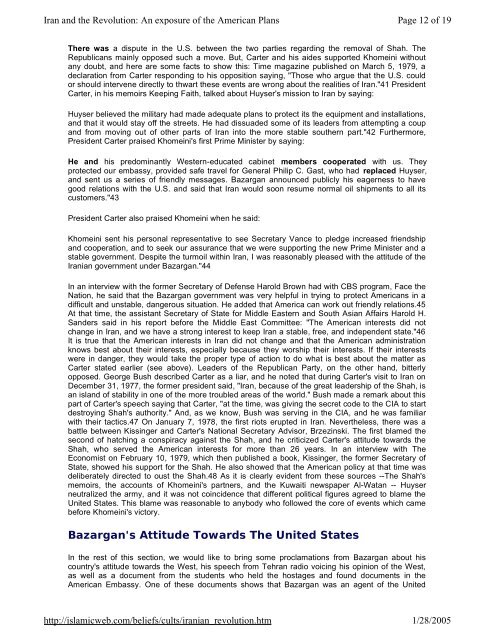Collection Of Articles (Refuting Shia) - Enjoy Islam
Collection Of Articles (Refuting Shia) - Enjoy Islam
Collection Of Articles (Refuting Shia) - Enjoy Islam
Create successful ePaper yourself
Turn your PDF publications into a flip-book with our unique Google optimized e-Paper software.
Iran and the Revolution: An exposure of the American Plans<br />
Page 12 of 19<br />
There was a dispute in the U.S. between the two parties regarding the removal of Shah. The<br />
Republicans mainly opposed such a move. But, Carter and his aides supported Khomeini without<br />
any doubt, and here are some facts to show this: Time magazine published on March 5, 1979, a<br />
declaration from Carter responding to his opposition saying, "Those who argue that the U.S. could<br />
or should intervene directly to thwart these events are wrong about the realities of Iran."41 President<br />
Carter, in his memoirs Keeping Faith, talked about Huyser's mission to Iran by saying:<br />
Huyser believed the military had made adequate plans to protect its the equipment and installations,<br />
and that it would stay off the streets. He had dissuaded some of its leaders from attempting a coup<br />
and from moving out of other parts of Iran into the more stable southern part."42 Furthermore,<br />
President Carter praised Khomeini's first Prime Minister by saying:<br />
He and his predominantly Western-educated cabinet members cooperated with us. They<br />
protected our embassy, provided safe travel for General Philip C. Gast, who had replaced Huyser,<br />
and sent us a series of friendly messages. Bazargan announced publicly his eagerness to have<br />
good relations with the U.S. and said that Iran would soon resume normal oil shipments to all its<br />
customers."43<br />
President Carter also praised Khomeini when he said:<br />
Khomeini sent his personal representative to see Secretary Vance to pledge increased friendship<br />
and cooperation, and to seek our assurance that we were supporting the new Prime Minister and a<br />
stable government. Despite the turmoil within Iran, I was reasonably pleased with the attitude of the<br />
Iranian government under Bazargan."44<br />
In an interview with the former Secretary of Defense Harold Brown had with CBS program, Face the<br />
Nation, he said that the Bazargan government was very helpful in trying to protect Americans in a<br />
difficult and unstable, dangerous situation. He added that America can work out friendly relations.45<br />
At that time, the assistant Secretary of State for Middle Eastern and South Asian Affairs Harold H.<br />
Sanders said in his report before the Middle East Committee: "The American interests did not<br />
change in Iran, and we have a strong interest to keep Iran a stable, free, and independent state."46<br />
It is true that the American interests in Iran did not change and that the American administration<br />
knows best about their interests, especially because they worship their interests. If their interests<br />
were in danger, they would take the proper type of action to do what is best about the matter as<br />
Carter stated earlier (see above). Leaders of the Republican Party, on the other hand, bitterly<br />
opposed. George Bush described Carter as a liar, and he noted that during Carter's visit to Iran on<br />
December 31, 1977, the former president said, "Iran, because of the great leadership of the Shah, is<br />
an island of stability in one of the more troubled areas of the world." Bush made a remark about this<br />
part of Carter's speech saying that Carter, "at the time, was giving the secret code to the CIA to start<br />
destroying Shah's authority." And, as we know, Bush was serving in the CIA, and he was familiar<br />
with their tactics.47 On January 7, 1978, the first riots erupted in Iran. Nevertheless, there was a<br />
battle between Kissinger and Carter's National Secretary Advisor, Brzezinski. The first blamed the<br />
second of hatching a conspiracy against the Shah, and he criticized Carter's attitude towards the<br />
Shah, who served the American interests for more than 26 years. In an interview with The<br />
Economist on February 10, 1979, which then published a book, Kissinger, the former Secretary of<br />
State, showed his support for the Shah. He also showed that the American policy at that time was<br />
deliberately directed to oust the Shah.48 As it is clearly evident from these sources --The Shah's<br />
memoirs, the accounts of Khomeini's partners, and the Kuwaiti newspaper Al-Watan -- Huyser<br />
neutralized the army, and it was not coincidence that different political figures agreed to blame the<br />
United States. This blame was reasonable to anybody who followed the core of events which came<br />
before Khomeini's victory.<br />
Bazargan's Attitude Towards The United States<br />
In the rest of this section, we would like to bring some proclamations from Bazargan about his<br />
country's attitude towards the West, his speech from Tehran radio voicing his opinion of the West,<br />
as well as a document from the students who held the hostages and found documents in the<br />
American Embassy. One of these documents shows that Bazargan was an agent of the United<br />
http://islamicweb.com/beliefs/cults/iranian_revolution.htm<br />
1/28/2005
















